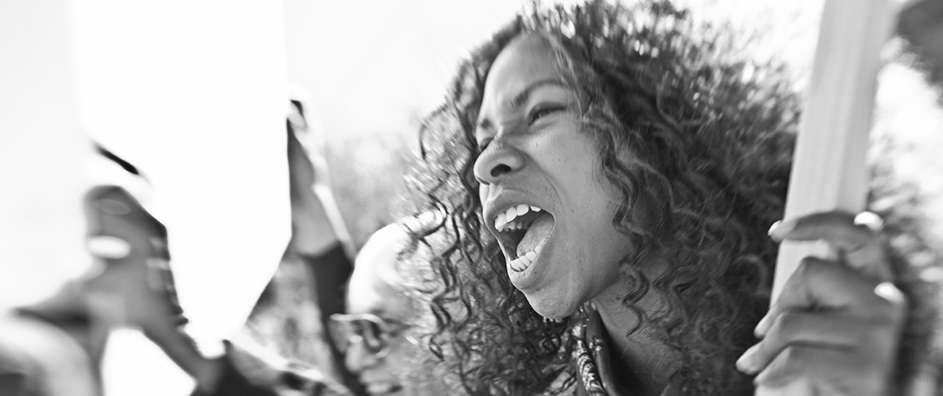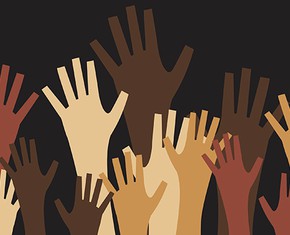The views expressed in our content reflect individual perspectives and do not represent the authoritative views of the Baha'i Faith.
Anger—one of the most powerful human emotions—can shape our relationships with other individuals, and our relationship to the society around us. With that thought in mind, let’s consider some perspectives from the Baha’i teachings on anger and its place in our lives.
Sometime, somewhere, I’ll be doing something. Things will seem normal, regular, and under control. Then suddenly something negative happens. Maybe I’m there to see it; maybe not. Regardless, someone gets really angry—and even if that anger isn’t directed at me, the sheer force of all that negative emotion erupts into my awareness. Maybe I know in advance why that person would get angry in that situation. But maybe I don’t, and it comes as a total surprise.
Everyone experiences anger at one time or another—other people’s anger, or our own. It’s easy to understand how anger can become a problem. It can lead to fights, bitter rivalries, toxic relationships, and even wars. But still, obviously, as any upset person can explain perfectly well, people tend to get angry for a reason. The anger response tends to flow spontaneously from a perception that something has gone very wrong and needs to be made right. Anger is a part of the human condition. It isn’t the same thing as hate, and it isn’t the opposite of love.
One of the most interesting discussions of human emotion in the Baha’i teachings comes in an explanation about differences in character between people, when Abdu’l-Baha points out that there is nothing inherently evil in human nature. He uses the examples of greed and anger to demonstrate that nothing about a human being is evil on its own—but can only become evil if used in the wrong way.
I love his explanation, not just because it shines such a bright light on human nature, greed, and anger, but also because it helps me to understand how to relate to situations of social injustice, where legitimate anger can lead to change:
In the innate nature of things there is no evil—all is good. This applies even to certain apparently blameworthy attributes and dispositions which seem inherent in some people, but which are not in reality reprehensible. For example, you can see in a nursing child, from the beginning of its life, the signs of greed, of anger, and of ill temper; and so it might be argued that good and evil are innate in the reality of man, and that this is contrary to the pure goodness of the innate nature and of creation. The answer is that greed, which is to demand ever more, is a praiseworthy quality provided that it is displayed under the right circumstances. Thus, should a person show greed in acquiring science and knowledge, or in the exercise of compassion, high-mindedness, and justice, this would be most praiseworthy. And should he direct his anger and wrath against the bloodthirsty tyrants who are like ferocious beasts, this too would be most praiseworthy. But should he display these qualities under other conditions, this would be deserving of blame.
It follows therefore that in existence and creation there is no evil at all, but that when man’s innate qualities are used in an unlawful way, they become blameworthy. – Abdu’l-Baha, Some Answered Questions, newly revised version, pp. 248-249.
One thing that stands out in the use of the term “bloodthirsty tyrants who are like ferocious beasts” is the implicit reference to the general order of society. Abdu’l-Baha doesn’t just associate anger with “something I don’t like that somebody did to me.” He doesn’t identify anger with mere disagreement. Instead, he presents it as an appropriate and praiseworthy response to the injustice of state and society. In another place he writes:
The Kingdom of God is founded upon equity and justice, and also upon mercy, compassion, and kindness to every living soul. Strive ye then with all your heart to treat compassionately all humankind—except for those who have some selfish, private motive, or some disease of the soul. Kindness cannot be shown the tyrant, the deceiver, or the thief, because, far from awakening them to the error of their ways, it maketh them to continue in their perversity as before. – Abdu’l-Baha, Selections from the Writings of Abdu’l-Baha, p. 158.
With that said, I want to frame our understanding of these ideas within the general mission of the Baha’i Faith to foster unity in our communities and in society at large. In many places in their writings, Baha’u’llah and Abdu’l-Baha make it clear that coercion, intimidation, and antagonism do direct harm to any effort to improve society; even when the weak act against the strong. For that reason, expressions of anger typically have little to no place in Baha’i-inspired social action and public discourse. Baha’is emphasize consultation, consensus, bridge-building, and constructive problem solving. Baha’is avoid anything that stresses division between people, especially political partisanship and efforts to overthrow governments:
It is incumbent upon every man, in this Day, to hold fast unto whatsoever will promote the interests, and exalt the station, of all nations and just governments. – Baha’u’llah, Gleanings from the Writings of Baha’u’llah, p. 94.
For these reasons, Abdu’l-Baha’s approval of anger at social injustice is particularly thought-provoking. Careful consideration of his meaning shows us that it’s okay to get upset, even a little riled up, when society tramples on principles of fairness and equality. Since Abdu’l-Baha uses the term praiseworthy instead of a milder word like acceptable or permissible, we might even be justified in rebuking ourselves if injustice doesn’t make us angry.
As we try to foster unity among humanity—so long as we don’t become attached to our hard feelings, or let them dampen the fire of universal love within our hearts—expressions of anger can kindle our passion for justice and strengthen our commitment to work for a better world. Listening to and respectfully considering what anger might reveal about our communities, our society, and ourselves can lead us to justice, fairness and equity. Then, as the heat of that angry moment passes, we can join hands, open our hearts, and take up the task of building a world we truly want to live in.
















Comments
Sign in or create an account
Continue with Googleor